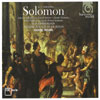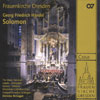Handel Solomon
A top-flight cast and vital music-making give us a striking Solomon from Berlin
View record and artist detailsRecord and Artist Details
Composer or Director: George Frideric Handel
Genre:
Vocal
Label: Harmonia Mundi
Magazine Review Date: 12/2007
Media Format: CD or Download
Media Runtime: 155
Mastering:
Stereo
DDD
Catalogue Number: HMC901949/50

Tracks:
| Composition | Artist Credit |
|---|---|
| Solomon |
George Frideric Handel, Composer
Akademie für Alte Musik Berlin Berlin RIAS Chamber Choir Carolyn Sampson, Soprano Daniel Reuss, Conductor David Wilson-Johnson, Bass George Frideric Handel, Composer Mark Padmore, Tenor Sarah Connolly, Contralto (Female alto) Susan Gritton, Soprano |
Composer or Director: George Frideric Handel
Genre:
Vocal
Label: Carus
Magazine Review Date: 12/2007
Media Format: Super Audio CD
Media Runtime: 157
Mastering:
Stereo
DDD
Catalogue Number: CARUS83242

Tracks:
| Composition | Artist Credit |
|---|---|
| Solomon |
George Frideric Handel, Composer
Claron McFadden, Soprano Dominique Labelle, Soprano George Frideric Handel, Composer Göttingen Festival Orchestra Michael Slattery, Tenor Nicholas McGegan, Conductor Roderick Williams, Baritone Tim Mead, Countertenor Winchester Cathedral Choir |
Author: Richard Wigmore
As a counterpoise to the work's pomp and opulence, several of the solo numbers - say, Solomon's “What though I trace each herb and flow'r?”, the first harlot's musette-lullaby “Beneath the vine”, or Sheba's nostalgic “Will the sun forget to streak?” - are suffused with an almost pantheistic ecstasy (shades here of the Miltonic ode L'Allegro). The love scene between Solomon - here a model of monogamy rather than the incontinent womaniser of biblical fame - and his queen is Handel at his most sensuous, culminating in the ravishing so-called “Nightingale” chorus. While the outer acts are in essence a series of vivid tableaux, Handel the dramatist is to the fore in the judgement scene, a masterpiece of psychological penetration that climaxes in an aria of piercing beauty and emotional truth for the rightful mother. In his pioneering Handel's Dramatic Oratorios and Masques (OUP: 1959), Winton Dean advocated the excision of several arias (mainly for the priestly figures of Zadok and the Levite) and the replacement of the closing chorus by the monumental “Praise the Lord” - a policy followed by John Eliot Gardiner (Philips), though not by the completist Paul McCreesh (Archiv). In his new recording, Daniel Reuss ditches the final chorus, though he omits just two arias, neither lamented. He also makes puzzling internal cuts in the duet for Solomon and the first harlot, and, more damagingly, the gorgeous opening number of the masque.
That said, I enjoyed the Harmonia Mundi recording almost unreservedly. Abetted by his crack period orchestra and 40_strong chorus, Reuss is responsive alike to the oratorio's ceremonial splendour and its fragrant pastoral tinta. The versions by Gardiner and McCreesh, balanced rather more in favour of the voices, generate an extra weight and sonorous magnificence in the great double choruses. But the vitality and refinement of the Berlin choir is always compelling. With terrific controlled raucousness from antiphonal wind and brass, the opening chorus of Act 2 is as elementally thrilling as it should be. At the other extreme, the Nightingale chorus, taken slowly and secretively, is at least the equal of McCreesh's in drowsy amorous enchantment.
Where the earlier recordings each have at least one unsatisfactory soloist, Reuss's solo line-up could hardly be bettered. Handel cast the role of Solomon with a mezzo-soprano. Reuss does likewise with Sarah Connolly, who sings with glowing, even tone, ardour (in the love scene), and rapt inwardness in Solomon's two “nature” arias. Susan Gritton makes a gently sensuous queen (her musing “With thee th'unshelter'd moor I'd tread” a highlight) and probes the full poignancy and anguish of the first harlot's music. While yielding to Della Jones (Gardiner) and Susan Bickley (McCreesh) in sheer venom, Carolyn Sampson characterises with gusto as the second harlot, and beautifully softens her bright, vernal tone in “Will the sun forget to streak?” The priests are in the expert hands of Mark Padmore (exemplary in his bouts of coloratura) and the gravely sonorous David Wilson-Johnson.
Nicholas McGegan's live Dresden Solomon differs most obviously from Reuss's in being absolutely complete. Pace Winton Dean, I have a soft spot for the final chorus, a witty jeu d'esprit that initially sounds like a parody of the Nightingale chorus. McGegan does this with delightful nonchalance. Elsewhere he directs his responsive orchestra with his customary rhythmic verve and feeling for the grand gesture. He uses an all_male choir, as Handel himself did, often with memorable results, though the Frauenkirche's vast, resonant acoustic tends to mute the impact of the Winchester trebles in the antiphonal choruses.
Though they could make more of their words, McGegan's sopranos are both fine (Dominique Labelle, with her not unattractive fast vibrato, is especially moving as the first harlot); and Roderick Williams sings with warm, firm tone as the Levite. But I couldn't work up much enthusiasm for Michael Slattery's gusty Zadok or, crucially, for Tim Mead's pleasant but pallidly characterised Solomon, sung as if from the cathedral stalls. There are many good things here. But if you want this magnificent work complete, McCreesh's is the version to go for, while for consistently glorious Handel singing the new Harmonia Mundi recording, impressively directed by Reuss, takes the palm.
Discover the world's largest classical music catalogue with Presto Music.

Gramophone Digital Club
- Digital Edition
- Digital Archive
- Reviews Database
- Full website access
From £8.75 / month
Subscribe
Gramophone Full Club
- Print Edition
- Digital Edition
- Digital Archive
- Reviews Database
- Full website access
From £11.00 / month
Subscribe
If you are a library, university or other organisation that would be interested in an institutional subscription to Gramophone please click here for further information.




